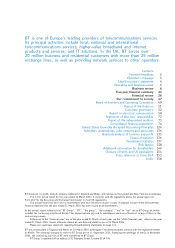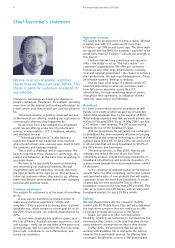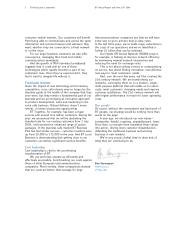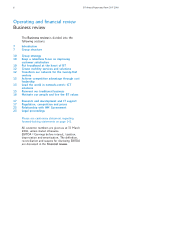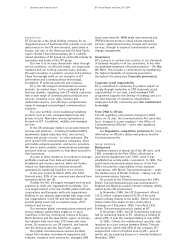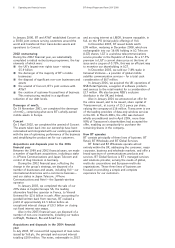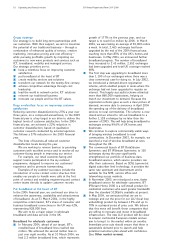BT 2004 Annual Report Download - page 8
Download and view the complete annual report
Please find page 8 of the 2004 BT annual report below. You can navigate through the pages in the report by either clicking on the pages listed below, or by using the keyword search tool below to find specific information within the annual report.Introduction
BT Group plc is the listed holding company for an
integrated group of businesses that provides voice and
data services in the UK and overseas, particularly in
Europe, but also in the Americas and the Asia Pacific
region. British Telecommunications plc is a wholly-
owned subsidiary of BT Group plc and holds virtually all
businesses and assets of the BT group.
Our aim is to increase shareholder value through
service excellence, an effective brand, our large-scale
networks and our existing customer base, and also
through innovation in products, services and solutions.
These increasingly build on our strengths in ICT
(information and communications technology),
broadband, IP (internet protocol) and solutions.
BT is the UK’s largest communications service
provider, by market share, to the residential and
business markets, supplying over 20 million customers
with a wide range of communications products and
services, including voice, data, internet and
multimedia services, and offering a comprehensive
range of managed and packaged communications
solutions.
Our core portfolio covers traditional telephony
products such as calls, analogue/digital lines and
private circuits. New wave revenue generation is
focused on ICT, broadband, mobility and managed
services.
In the UK wholesale market, we provide network
services and solutions – including broadband ADSL
(asymmetric digital subscriber line), interconnect,
transit and private circuits – to other operators. We
serve around 500 communications companies, fixed
and mobile network operators, and service providers.
We aim to build complete communications packages
and work with our customers to help them succeed in
their businesses.
Our aim in these markets is to continue to increase
profitable revenues from data and advanced
broadband and internet services, which will further
reduce our dependence on revenues and profit
generated by traditional fixed-line voice services.
In the year ended 31 March 2004 (the 2004
financial year), 93% of our revenues were derived from
operations within the UK.
Outside the UK, we supply managed services and
solutions to multi-site organisations worldwide. Our
core target market is the top 10,000 global multi-site
corporations and European multi-site organisations.
Building on our existing relationships with large multi-
site organisations in the UK and internationally, we
provide global reach and a complete range of ICT
solutions and services.
Our extensive global communications network and
strong strategic partnerships enable us to serve
customers in the key commercial centres of Europe,
North America and the Asia Pacific region. In Europe,
this network links more than 270 towns and cities
across 19 countries to our UK network, and beyond
into the Americas and the Asia Pacific region.
Our global communications services portfolio
ranges from desktop and network equipment and
software, transport and connectivity, managed LAN
(local area network), WAN (wide area network) and
IPVPN (internet protocol virtual private network)
services, applications hosting, storage and security
services, through to business transformation and
change management.
Governance
BT’s policy is to achieve best practice in our standards
of business integrity in all our operations, in line with
our published statement of business practice – The Way
We Work. This includes a commitment to maintaining
the highest standards of corporate governance
throughout the group (see Corporate governance).
Corporate social responsibility
BT is committed to enhancing its positive impact on
society through leadership in CSR (corporate social
responsibility). In our view, a well managed CSR
programme supports the delivery of strategy and is in
the best interests of customers, shareholders,
employees and the community (see Our commitment
to society).
From Oftel to Ofcom
The UK regulatory environment changed in 2003
when, on 25 July, the Communications Act came into
force, bringing in a new regulator – the Office of
Communications (Ofcom) – and a new regulatory
framework.
See Regulation, competition and prices for more
information on Ofcom’s duties and powers, and the
Communications Act.
Group structure
Background
Telephone services in almost all of the UK were, until
1981, provided by the Post Office, which was a
government department until 1969, when it was
established as a state public corporation. In 1981, the
postal and telecommunications services of the Post
Office became the responsibility of two separate
corporations, with British Telecommunications – under
the trading name of British Telecom – taking over the
telecommunications business.
As a result of the Telecommunications Act 1984,
British Telecommunications plc was incorporated in
England and Wales as a public limited company, wholly
owned by the UK Government.
In November 1984, the UK Government offered
3,012 million ordinary shares (50.2% of the total
issued ordinary shares) to the public. British Telecom
shares made their debut on the London Stock
Exchange on 3 December 1984. From April 1991,
British Telecommunications plc traded as BT.
In December 1991, the UK Government sold over
half its remaining shares in BT, retaining a holding of
about 22%. It sold this residual holding in July 1993.
In 1985, Cellnet, the mobile phone operator, was
launched as a joint venture between British Telecom
and Securicor, which held 40% of the company. BT
acquired full control of Cellnet (now O
2
UK – part of
mmO
2
plc) by acquiring Securicor’s minority holding in
November 1999.
7Operating and financial review BT Annual Report and Form 20-F 2004


